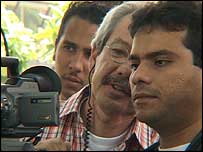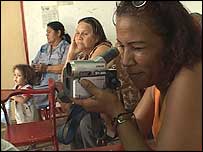Untitled Document
 |
Critics call the station a
propaganda channel for President Hugo Chavez |
"Grabando," he shouts ("recording").
A young journalism student walks into shot and says: "The news on Telesur,
the true face of Latin America."
Telesur is a new pan-Latin American TV channel based in Venezuela. It aims
to rival CNN and the other Spanish-language news channels coming out of Miami
and Atlanta.
Some have already dubbed it Al-Bolivar - a combination of the Arabic news channel,
Al-Jazeera, and President Hugo Chavez's favourite independence hero.
'Street-level view'
"It's a question of focus, of where we look at our continent from,"
says Mr Botero, Telesur's news director from Colombia.
 |
Mr Botero (centre) says the
channel will be independent - but not neutral |
"They look at it from the United States. So they give a rose-tinted, flavour-free
version of Latin America. We want to look at it from right here.
"We want our cameras to get into places that their cameras have never been,
to give a real, street-level view - like the girl said: 'The true face of Latin
America.'"
But there is still a long way to go. The cement-mixers and welders are working
flat out in a long-abandoned annexe, off the back of Venezuelan state TV.
This is where Telesur will have its main studio. By the end of September there
should be 40 journalists working here and in bureaux across the continent -
putting out a 24-hour mix of news, documentaries and movies, all with the stamp
"made in Latin America".
The first pre-recorded programmes are due to begin transmission at the end
of July.
Taste of tone
But Telesur's test signal is already on the air - giving a taste of what's
to come. One promo promises an investigation into "the hidden threads of
Plan Colombia", the $3bn US-funded drug-eradication programme in Colombia.
"Who will judge", the soundtrack asks, "the US military personnel
caught trafficking drugs and arms in Colombia?"
Most of the money for Telesur comes from Venezuela. But the governments of
Argentina, Uruguay and Cuba are also backing it.
Talks with Brazil are stalled, partly because the government there is trying
to get its own continental TV project off the ground.
Telesur's president, Venezuelan Communications Minister Andres Izarra, sees
the channel as an essential pre-requisite for closer political and economic
links across Latin America.
"We're launching Telesur as an initiative to integrate through communication
the different countries of the region," he told the BBC.
"It's a window, so we can get to know each other better."
The same principles even shape the channel's look. Telesur's head of promotions,
Rodney Sotillo, showed me on his computer how some of the graphics elements
fit together.
"The whole palette of colours we're using is linked to the different flags
of Latin America. Because the idea of Telesur in terms of graphics is unification
and integration, while also showing the diversity of our peoples."
 |
"Don't watch television. Make
it"- Slogan of community station Catia TV |
Communities
Another part of the inspiration comes from Venezuela's community TV movement.
I joined Iris, Gladys and Wilfredo, of Catia TV, in a small community hall in
the Caracas shanty town of San Juan. They were beginning to recruit and train
another of Catia TV's so-called community production teams.
The idea is to give poor communities like this their own say, by teaching ordinary
people, from children to pensioners, to make television programmes for themselves.
One of Catia's founders, Blanca Eekhout, is now the head of Venezuelan state
TV. She was an adviser on the establishment of Telesur.
"For me it's indispensable for communities to have in their hands channels
of communication which are their own. And what's more, this has to have an international
aspect."
Not that Telesur will be a copy of community channels like Catia TV. But, according
to Blanca Eekhout, it does aim to build on similar principles, giving a wider
hearing to the voices of Latin America seldom heard on other networks.
"[Telesur staff] are all in one political position, and that's the political position of our president", Alberto Ravell, Globovision
'Leftist propaganda'
To some, that sounds like propaganda. Last year, the chairman of the US Senate's
foreign relations committee, Richard Lugar, referred to the planned channel
as a vehicle to spread President Hugo Chavez's authoritarian message around
the region.
Alberto Ravell, the head of Venezuela's main private news channel, Globovision,
agrees.
"You're going to have a view of Latin America, but you're going to have
the view these governments want you to have, not an impartial view," he
said.
He told the BBC that all the people working at Telesur are leftist.
"They're all in one political position, and that's the political position
of our president that wants to be not only the president of Venezuela but the
leader of Latin America."
But for news director Mr Botero, Telesur's over-riding priority must be to
show things as they really are - and he doesn't care who that upsets.
"Some news always upsets some people. We'll just have to put up with that
and always defend our independence - which does not mean we'll be neutral. Independence,
yes. But neutrality, never."
Love it or hate it, it seems that Telesur, like Al-Jazeera in the Arab world,
is about to introduce a new tone into Latin American broadcasting.

